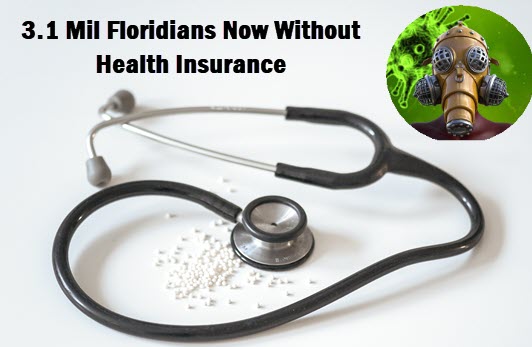Florida: 607,000 Newly Uninsured; 3.1 Mil Adults Without Health Insurance
Posted July 14, 2020 07:25 pm

Stethoscope: Markus Frieauff/Unsplash;
Covidman: Pete Linforth/Unsplash
TALLAHASSEE, FL – A new study estimates 5.4 million American workers lost employer-sponsored health insurance between February and May, including 607,000 Floridians, marking the largest single-year loss of coverage in the nation’s history.
According to the study by the nonpartisan health care advocacy group Families USA, the estimated increase in uninsured workers is nearly 40 percent higher than when 3.9 million nonelderly adults lost insurance during 2008-09’s Great Recession.
“We knew these numbers would be big,” Families USA’s National Center for Coverage Innovation Director Stan Dorn, who wrote the study, told the New York Times. “This is the worst economic downturn since World War II. It dwarfs the Great Recession. So it’s not surprising that we would also see the worst increase in the uninsured.”
Only California, where an estimated 689,000 are newly uninsured, and Texas, with 659,000 losing coverage, topped Florida. New York, with an estimated 298,000 losing coverage, was fourth.
With the addition of a projected 607,000 newly uninsured to the 2.5 million Floridians estimated to previously having been uninsured, an estimated 3.1 million adults in the state are uninsured.
About 25 percent of Florida’s nonelderly adults are uninsured, the study said. Texas, at 29 percent, is the only state with a higher percentage of uninsured adults. Nationwide, more than one in seven adults – 16 percent – are now uninsured, according to Families USA.
The higher percentage of uninsured is “increasing the odds that, if they contract COVID-19, delays in diagnosis and treatment could endanger both them and their communities,” the study said.
Nine out of the 10 states with the largest increases in uninsured are among the 15 states experiencing the biggest COVID-19 spikes, according to the study.
“This is particularly problematic during a pandemic involving a highly infectious, deadly disease, especially in states that are allowing residents to be in closer personal contact by attempting to reopen their economies – often the same states now experiencing significant spikes in COVID-19 infection rates,” the study said.
Four of every five people who have lost employer-provided health insurance are eligible for coverage through expanded Medicaid programs or government-subsidized private insurance through the Affordable Care Act (ACA), according to the Kaiser Family Foundation.
In the 37 states that have expanded Medicaid under ACA, the study estimated 23 percent of laid-off workers became uninsured. In the 13 states that haven’t done so, including Florida, an estimated 43 percent of newly jobless people have lost coverage.
Florida’s Agency for Health Care Administration (AHCA), which manages the state’s $30 billion Medicaid budget and 17 managed care plans, reported 4.06 million state residents were enrolled in Medicaid in May, up from 3.77 million in February.
Definitive data on insurance status won’t be available until late next year. The Families USA study was built on coverage patterns since 2014 and April calculations by the Urban Institute.
The Urban Institute and Robert Wood Johnson Foundation on Monday projected 10.1 million people will no longer have employer-sponsored insurance because of job loss by year's end.
A Kaiser Family Foundation study estimated 27 million Americans no longer have health insurance, including newly jobless workers’ families.
Despite the rising number of uninsured, “No federal COVID-19 legislation signed into law has attempted to restore or preserve comprehensive health insurance, which improves health outcomes, limits financial insecurity, and promotes economic recovery. Federal lawmakers can fill that gap in the next COVID-19 bill,” Families USA said.
The U.S. House has passed the Health and Economic Recovery Omnibus Emergency Solutions Act (HEROES Act), which would provide full premium subsidies for the newly jobless. The bill, however, has not been addressed by the Senate.
-------------------------------
This piece appeared in the The Center Square and was reprinted by the Columbia County Observer with permission or license.

 By
John Haughey | The Center Square
By
John Haughey | The Center Square